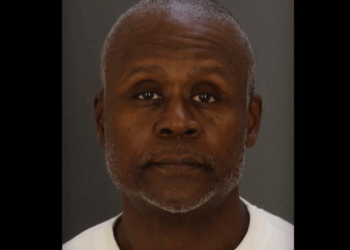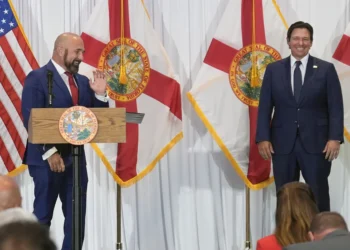On Friday, Kilmar Abrego Garcia — the illegal alien accused of being an MS-13 gang member, human smuggler, and domestic abuser — was released from a Tennessee jail and sent back to Maryland after a judge ordered his release. On Monday, Abrego Garcia turned himself in to immigration authorities in Baltimore. But before turning himself in to officials, Abrego Garcia delivered a speech thanking his supporters — in Spanish.
At first glance it may seem minuscule — a Salvadoran man giving a speech in his native tongue. But it’s actually emblematic of something much deeper: After 14 years living in the United States, Abrego Garcia apparently still cannot communicate in the language of the country he broke into — and is fighting to stay in. That alone underscores America’s broken system of assimilation.
As The Federalist previously reported, Abrego Garcia entered the U.S. illegally 14 years ago and was detained in March of 2019. He was charged with removability and later was denied bond when an immigration judge concluded — based on evidence — that Abrego Garcia “is a verified member of MS-13” and failed to prove “that his release from custody would not pose a danger to others.”
Abrego Garcia’s attorneys then filed an asylum claim six months later. This claim was also denied, though a judge did rule that while Abrego Garcia could be deported, he could not be sent to El Salvador. As Will Chamberlain, senior counsel at the Article III Project, explained, “Any third country would be sufficient.” Abrego Garcia was ultimately sent to El Salvador — his native country — before being brought back to the U.S., where he was later charged with human smuggling.
Abrego Garcia was booked in a Tennessee jail before a judge ordered his release, which took place on Friday. Abrego Garcia is expected to be deported, possibly to Uganda (where English and Swahili are the primary spoken languages). But for Abrego Garcia, it hardly matters that English is spoken there because after 14 years living in America, he apparently still cannot speak English well enough to tell a crowd: “God is with us, and God will never leave us. God will bring justice to all the injustice we are suffering.”
That’s the real story. Fourteen years in this country and no assimilation. No effort to learn the language to be part of the American community. No willingness to embrace the most basic expectation of anyone who wants to live here permanently — learning the language. Without English, there is no real full participation in American life. It’s the foundation of our civic life, our culture, and our national identity.
And yet, Abrego Garcia isn’t alone. Millions of aliens in the country don’t speak English at all. That’s not just a failure on their end — it’s a failure on ours, too. We’ve built a system over the past few decades in which it is entirely possible to live and work without ever having to fully assimilate. We’ve allowed the rise of insulated enclaves where English is unnecessary, and in doing so, we’ve undermined the very idea of a shared national culture.
Think about it for a moment. Go into the DMV, and there are signs in Spanish. Call up a company to dispute a bill, and you’ll be prompted to “press 1 for English.” Even our elections are structured around the assumption that assimilation is optional. As explained by the National Conference of State Legislatures, “limited English proficiency voters represent a significant demographic” and speaking English “is not a requirement for voting.” According to the NCSL, to uphold provisions of the Voting Rights Acts, 331 jurisdictions in 30 states “must offer voting materials in at least one language other than English.”
This should never have been allowed to happen. America cannot survive if she is reduced to nothing more than a patchwork of separate communities divided by language and culture. Assimilation isn’t optional. A nation without a common language is not a nation at all — it’s just a bunch of strangers who happen to occupy the same space. A language binds one people together, but without a language, you don’t have a united people — and you don’t have the United States.
And that brings us back to Abrego Garcia, a man who managed to live here for 14 years, seemingly without learning English — because America allowed him to (in more ways than one). His speech in Baltimore was symbolic of a deeper problem: Aliens — legal and illegal — are simply not willing to assimilate.
Brianna Lyman is an elections correspondent at The Federalist. Brianna graduated from Fordham University with a degree in International Political Economy. Her work has been featured on Newsmax, Fox News, Fox Business and RealClearPolitics. Follow Brianna on X: @briannalyman2
















